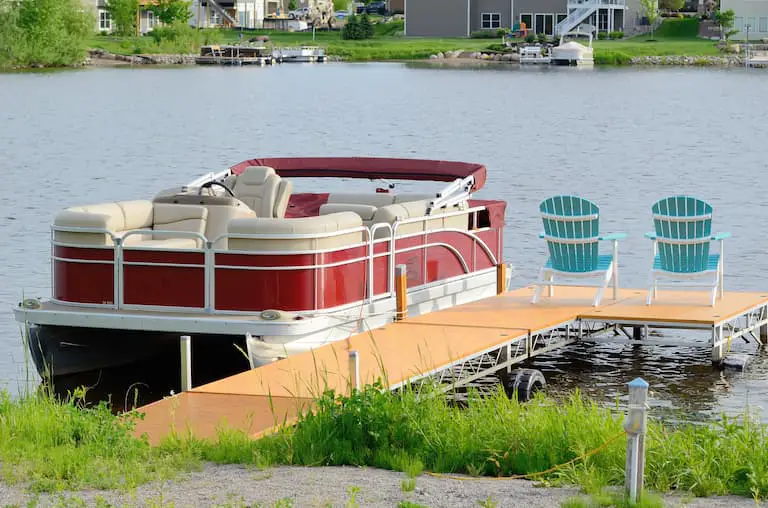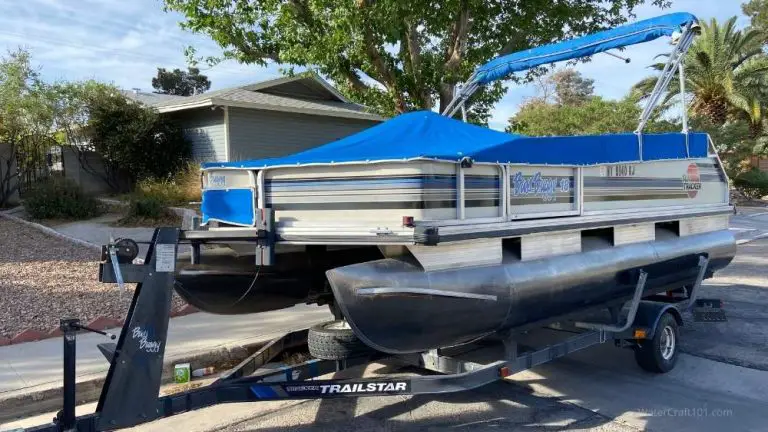Can You Get Seasick on a Pontoon Boat? (Explained)
Pontoon boats are growing in popularity for boat owners due to their versatile design and function. One downside to pontoons (as with any boat) is the potential for seasickness, a form of motion sickness caused by movement over water.
You can get seasick on a pontoon boat. However, your seasickness may be less severe than on another kind of boat because of its unique design. Pontoon boats are the best option for people who struggle with seasickness because they provide a smoother ride due to having two or more pontoons.
This article will discuss why the design of a pontoon boat helps alleviate seasickness, the causes of seasickness, and how to avoid and cure it while boating.

Why Are You Less Likely To Get Seasick on a Pontoon Boat Than on Other Boats?
You’re less likely to get seasick on a pontoon boat than on other boats because their flat base and multiple pontoons create a more steady platform on the water than a regular monohull boat. The two or more pontoons help to somewhat even out the motion of the waves on the water’s surface.
If you suffer from seasickness but still have a love for boating, a pontoon boat is a good option. You’ll still feel the motion of the waves, likely causing light motion sickness, but it will be significantly smoother than other boat designs.
Your seasickness will probably be more manageable on a pontoon boat, allowing you to still enjoy the ride.
What Causes Seasickness?
Seasickness is caused by the disorientation of the senses from excess outside motion. This motion usually affects the fluid in your inner ears, where balance is controlled.
Seasickness can take on a variety of forms. You may experience migraines, nausea, vomiting, or even loss of consciousness. More mild symptoms include pale skin, sweating, and a sudden tired sensation.
Seasickness is a common irritation for even the most experienced boater. If motion sickness is a common problem for you in the car, you will likely struggle with seasickness whether you’re on a pontoon boat or not. Pontoon boats, however, have the best design to avoid extreme symptoms of seasickness.
Six Tips To Avoid Getting Seasick on a Pontoon Boat
There are several methods to avoid seasickness. Since pontoon boats already lessen the motion you will experience on the water, you will probably want to try some less invasive options.
Many sailors use medications to prevent seasickness, but there’s often a side effect of extreme sleepiness that would hinder your enjoyment of the outing.
Here are six tips to avoid getting seasick on a pontoon boat without the possibility of adverse side effects:
1. Avoid Rough Weather Conditions
Although pontoon boats can minimize the risk of seasickness more effectively than other types of boats, extreme weather conditions, such as strong winds and waves can still cause excessive and uncomfortable motion on your boat. As a result, you may still suffer from a severe bout of seasickness.
That is why it is necessary to check the weather condition before setting out into the water on your pontoon boat and avoid harsh weather conditions.
2. Bring Natural Remedies
Sometimes, bad weather may suddenly set in on an otherwise pleasant day. Before getting onto the pontoon boat, pack some natural remedies to use if you feel the onset of seasickness. Ginger and peppermint come in various forms, from drinks to candies. Both of these treats aid in seasickness and nausea.
Another option is essential oils. Be sure to research which oils help with seasickness, as every essential oil company uses its own names for its oil blends. Therapeutic grade essential oils are the strongest and most effective.
3. Wear an Acupressure Band
Acupressure bands are bracelets that apply pressure to the wrist and are proven to help with motion sickness. It’s safe to wear one regardless if you feel sick or not. It’s recommended to put the acupressure band on your wrist before any symptoms occur to lessen or completely prevent the onset of seasickness.
If you struggle with seasickness, be sure to put the acupressure band (Amazon) on before boarding the boat.
4. Stay Hydrated
Dehydration causes many of the same symptoms as seasickness. Consequently, if you’re dehydrated, your seasickness will worsen. Have a bottle of water or electrolyte beverage on hand throughout your trip and continue to sip off of it.
5. Pack Some Snacks
Like dehydration, hunger can aggravate seasickness symptoms. Bring protein-rich snacks for your ride to keep yourself from getting low blood sugar from hunger. However, try to avoid snacking too much as it may be counterproductive.
6. Practice Mindfulness and Deep Breathing
If you get onto the pontoon boat fearing seasickness, you are likely to worsen your symptoms. Take deep breaths, enjoy the view, and allow your anxiety to dissipate. Your state of mind plays a significant role in how your body reacts to its environment.
How To Cure Seasickness
There’s no one-time, perfect cure for seasickness. However, if you still experience seasickness, do not fret. You can still lessen the symptoms. There are three main ways to get rid of seasickness. Most of these methods require tapping back into your prevention strategies.
1. Utilize Your Natural Remedies, Snacks, and Drinks
Ginger chews, ginger oil, or peppermint sticks will quickly lessen your symptoms. You can then apply or smell your essential oils according to their instructions for lasting relief. Remember to check the product label before using a remedy as you may be sensitive to it.
2. Return to Your Deep Breathing and Mindfulness Exercises
Take deep breaths and encourage a peaceful mental state while enjoying the view and fresh air. Try not to leave the deck or sit with your head in your lap. These actions will only worsen your symptoms.
If you have boat companions, advise them beforehand of your tendency to suffer from seasickness so that they can help you feel better when it kicks in.
3. Take Motion Sickness or Nausea Medication
If motion sickness is a common ailment for you, bring medication just in case onto the pontoon boat. In the case that you don’t have it on hand, a fellow rider or the owner of the boat will likely have some. Ask around, and if there’s medication available, be sure to take it with a glass of water.
Can You Get Seasick on a Pontoon Boat – Summary
Pontoon boats are an excellent boating option for those who struggle with seasickness. Because of its flat, versatile build, the pontoon boat’s design provides the smoothest ride possible, eliminating many of the factors that aggravate seasickness.
If you struggle with seasickness, there are many cures and prevention methods to try. You should stay hydrated, snack, wear an acupressure band, have natural remedies on hand, and practice deep breathing and mindfulness to avoid or lessen seasickness.






